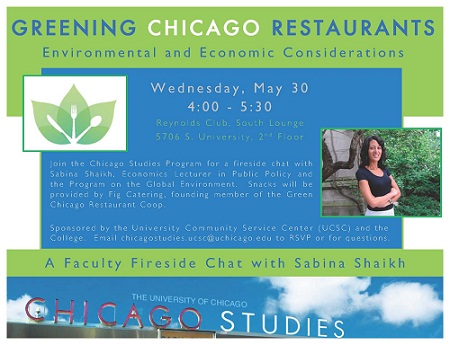Greening Chicago Restaurants

By: Lily Gordon, Class of 2015
We hear the word "sustainability" often these days--but have you ever wondered how this concept applies to a restaurant in a city? What does the "green" certification of a restaurant mean? Does it mean a friendlier environmental performance? Better economic performance? Engagement with the city in creating food awareness?
This winter and spring, University of Chicago Economics Lecturer and Director of the Green Restaurant Research Team Sabina Shaikh has explored these questions with 35 students in a research-based class called Environment, Agriculture and Food: Economic and Policy Analysis.
On Wednesday, Shaikh, who describes herself as "sustainability- and organic-aware", discussed greening Chicago restaurants at a fireside chat hosted by the Chicago Studies Program.
Environment, Agriculture and Food: Economic and Policy Analysis, which is cross-listed under Economics, Environmental Studies, the Harris School, and Public Policy,is a two-quarter sequence during which students have been divided into several research groups such as Local Engagement, Financing and Incentives, and Food and Beverages.
"There are between six and ten students per group, and every student is in two groups so they can really be engaged across different parts of the research," Shaikh said.
The students have a team of about 50 advisors, made up of restaurant owners and managers, sustainability experts, and professionals who work both in the energy sector and in waste management. The students have also been proactive in finding their own resources, conducting surveys and interviews, and planning and taking field trips.
The goal: to create recommendations for a Chicago-specific green restaurant certification.
"We had a partnership with the Green Chicago Restaurant Coalition, which was very interested in knowing how green certification for restaurants fits into the context of the local food landscape in Chicago. This involves not only food, but also waste, composting, water--all of the things that would not be comparable across cities on a national scale. How does green certification in Chicago make sense?" said Shaikh.
The class is using its research to create recommendations, focusing mostly on non-profit organization Green Seal's certification, a standard that no restaurant has yet adopted. Shaikh and her students are working with this "third party" group to contribute to the effort to create a more sustainable world, and to make a more realistic restaurant certification program specific to Chicago. Some sustainable practices for restaurants include reducing water usage, waste outputs, and energy use; recycling; and purchasing food locally.
In creating these recommendations, the students have been examining the environmental impact, as well as the economic cost and benefit, of Green Seal's existing certification. The class has explored financial costs, time and information costs, direct returns, indirect returns, and social benefits.
Shaikh explained social benefits: "It's an important economic concept. It includes overall benefits to human health, benefits that contribute to the city's climate action plan, or food plan, or things for which the restaurant doesn't necessarily receive the benefits, but the city does."
While the class looks for economic incentives for restaurants to "go green," it also aims to create a more sustainability- and food-conscious city.
As the quarter draws to a close, students are finishing their recommendations. To some, this research will extend into summer internships at restaurants, where they will help to implement these suggestions and witness the results.
0 TrackBacks
Listed below are links to blogs that reference this entry: Greening Chicago Restaurants.
TrackBack URL for this entry: https://blogs.uchicago.edu/cgi-bin/mt/mt-tb.cgi/739

This is very interesting to note such practices have been thought about.Sustainability itself means to keep something alive or healthy for longer period of time.Undergoing analysis with various factors in mind would certainly help in coming to conclusion that can become the basis for certification.
I appreciate such endeavours!!would like to know the final doc. when it is ready.
PV